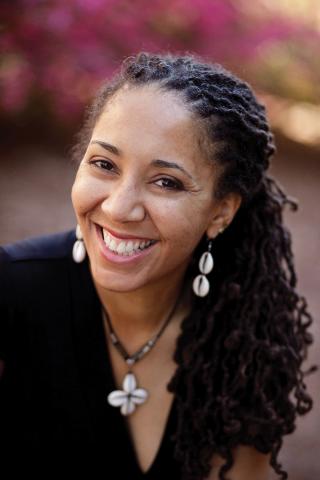
Writer, scholar and activist, Monica A. Coleman is committed to connecting faith and social justice. An ordained elder in the African Methodist Episcopal Church, Coleman has earned degrees at Harvard University, Vanderbilt University and Claremont Graduate University. Coleman is currently Associate Professor of Constructive Theology and African American Religions and Co-Director of the Center for Process Studies at Claremont School of Theology in southern California.
She blogs on the intersection of faith and depression at www.BeautifulMindBlog.com and writes a column, “Women, In Flesh and Spirit” atwww.Patheos.com, the website named by Newsweek as “the place to get smarter about religion.” She has been featured as an interviewed guest on NPR, blogtalk radio shows and www.PsychCentral.com. She is a research fellow with the New Media Project that helps religious leaders become theologically savvy about technology. For her willingness to share and serve online, she was listed as 2012’s Top 100 by the Digital Sisterhood Network. She often teaches Bible study in her local church, and speaks widely on religion and sexuality, religious pluralism, churches & social media, mental health, and sexual and domestic violence.
Because of her work with religion and justice, the interdenominational preaching magazine The African American Pulpit named Coleman one of the “Top 20 to Watch” – The New Generation of Leading Clergy: Preachers under 40. Coleman’s articles have been featured in a variety of publications including ESSENCE, Journal of Feminist Studies in Religion, Philosophia and Aspire: Women of Color Study Bible.
Posts By This Author
'Too Blessed to Be Stressed'
... and other phrases Monica Coleman thinks the church should erase from its vocabulary.

Sean Bear/ Shutterstock
IN A GIVEN YEAR, about one in five U.S. adults will experience mental illness of some kind. And though mental illness does not discriminate, African-American adults are more likely to experience serious mental health problems, but less likely to seek treatment, than white folks, due in part to the lasting effects of slavery, segregation, and other forms of race-based exclusion—effects that translate into socioeconomic factors such as poverty, homelessness, and substance abuse which are, in turn, risk factors for mental illness.
According to the National Alliance on Mental Illness (NAMI), the factors that keep African Americans from receiving mental health services include a lack of health insurance, a distrust of the medical community, and conscious or unconscious bias among practitioners resulting in misdiagnoses. But NAMI also named another barrier to African-American mental health: the church. While one’s “spiritual leaders and faith community can provide support and reduce isolation,” explained NAMI, the church can also “be a source of distress and stigma.” The report noted that even when medical care is necessary, African Americans turn to their families, communities, and churches rather than turning to health-care professionals.
None of this comes as a surprise to Monica Coleman, a professor of constructive theology and African-American religions at Claremont School of Theology in Southern California. Throughout her new memoir, Bipolar Faith: A Black Woman’s Journey with Depression and Faith, Coleman navigates the challenges of race, gender, and the church as she heals from rape (committed by her then-boyfriend in seminary) and wrestles with a faith that ebbs and flows like the cycles of severe depression that began as she entered adulthood.
Sojourners assistant editor Betsy Shirley spoke with Coleman about mental health, social justice, and how the church might become a place that more fully fosters both.